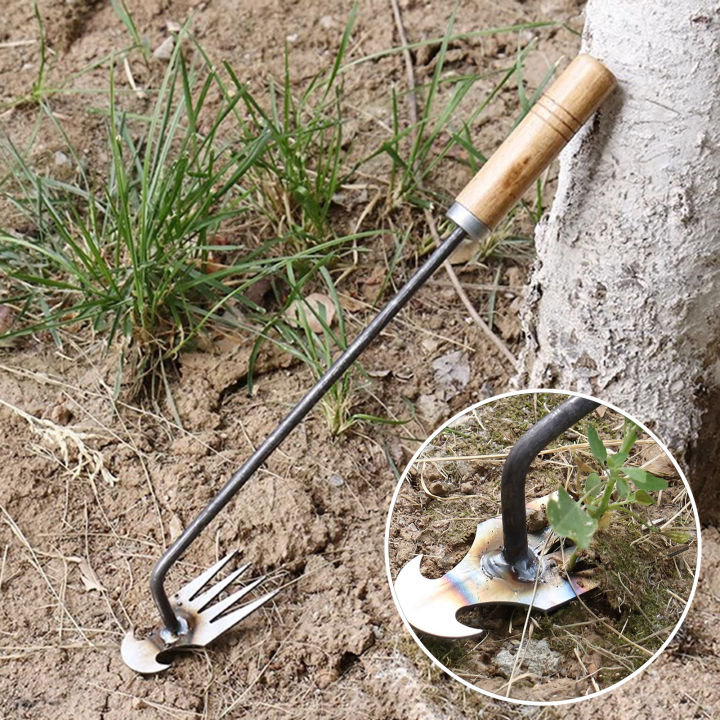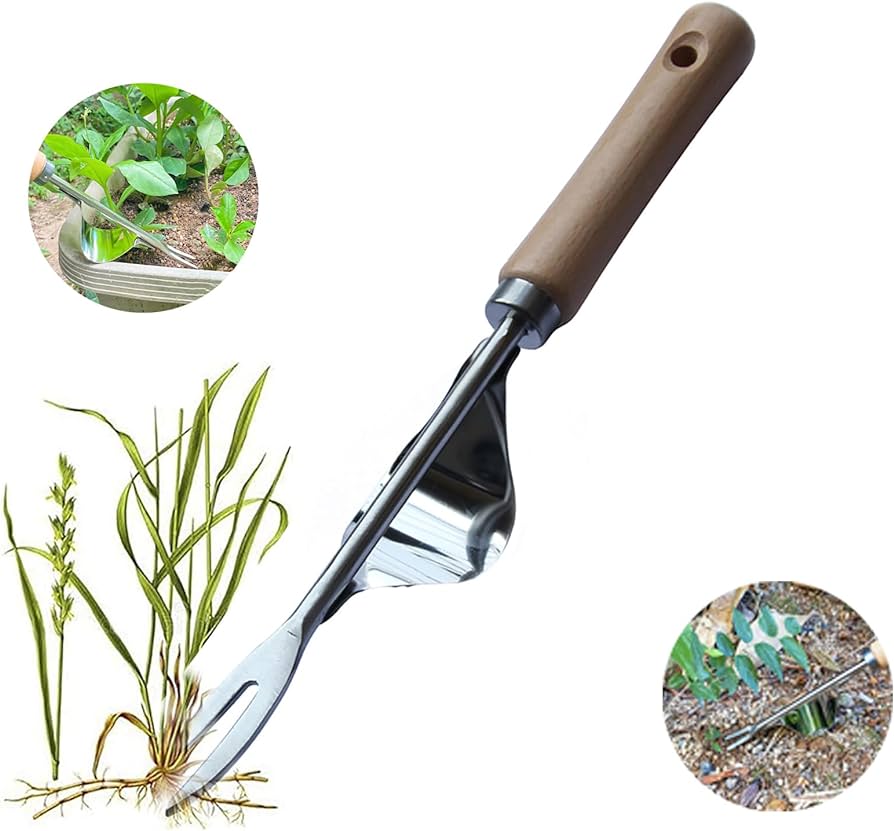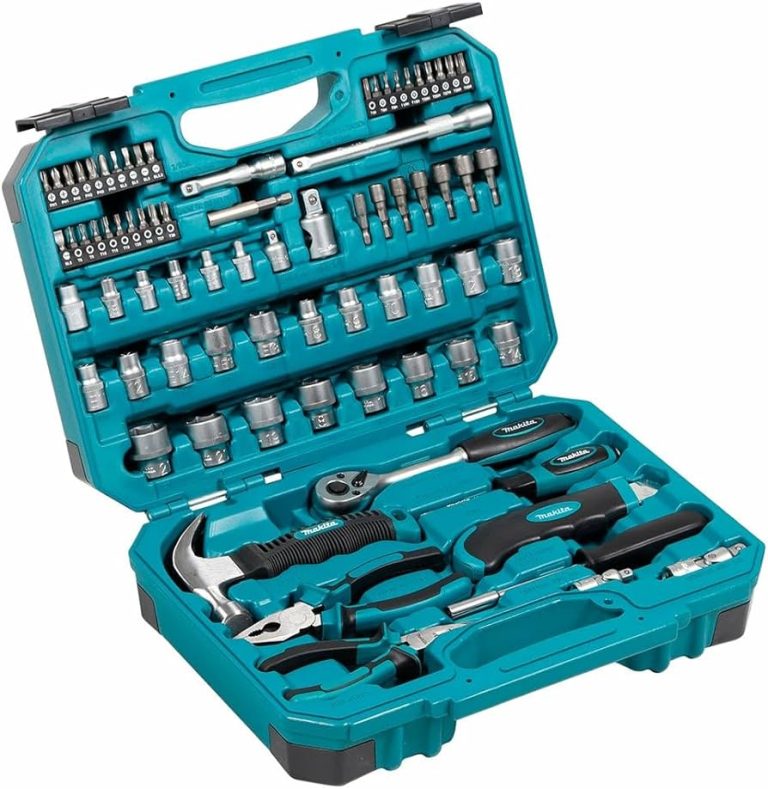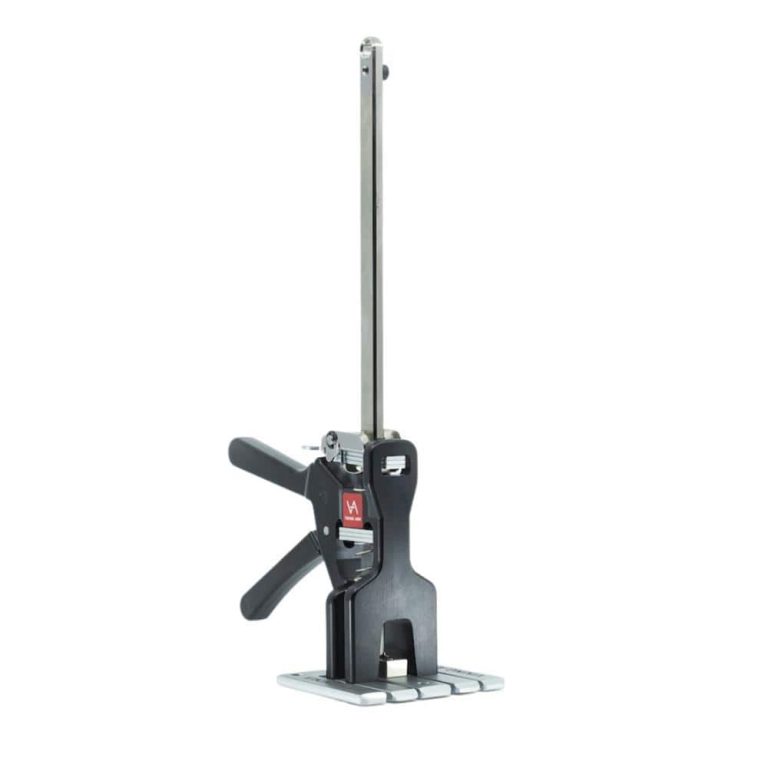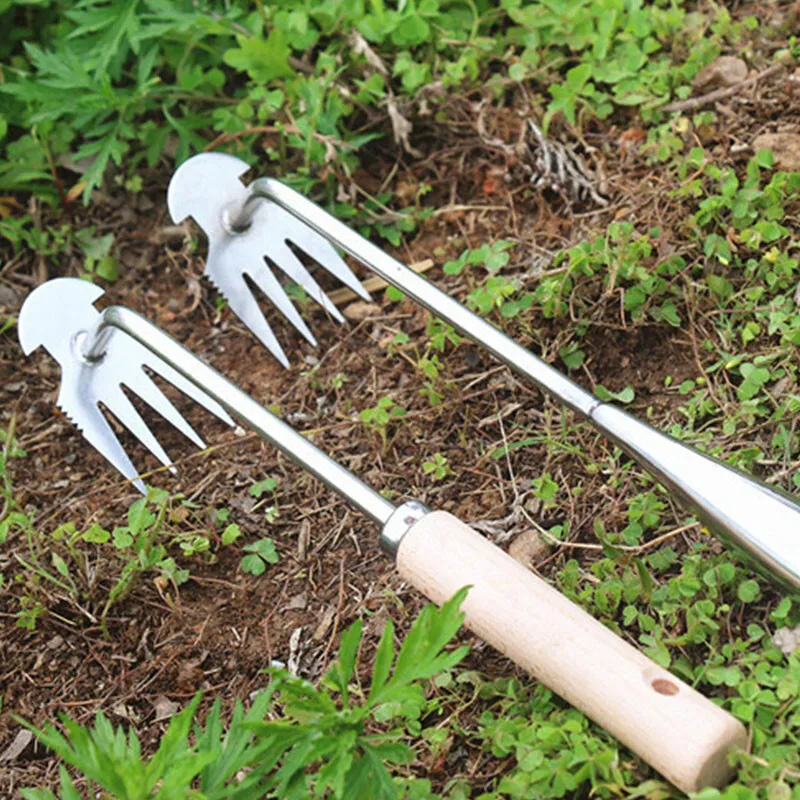
Hand Weeder Tool: The Ultimate Guide for Gardeners
Hand Weeder Tool: The Ultimate Guide for Gardeners
Hand weeder tools are essential for maintaining a beautiful, weed-free garden. These versatile implements help remove unwanted plants efficiently and effectively. This comprehensive guide explores everything you need to know about hand weeder tool, their uses, and how to choose the right one for your gardening needs.
What is a Hand Weeder Tool?
A hand weeder tool is a manual gardening implement used for removing weeds from the soil. It typically consists of a handle and a specialized head designed to extract weeds with minimal soil disturbance. Hand weeders come in various designs to suit different weed types and soil conditions.
Key Features:
- Manually operated
- Requires no fuel or electricity
- Suitable for precise weed removal
- Allows for targeted work around delicate plants
Hand weeders offer an eco-friendly and precise alternative to chemical weed control methods.
Types of Hand Weeder Tools
Several types of hand weeder tools exist, each designed for specific gardening tasks:
Fishtail Weeder
Fishtail weeders feature a forked metal end. They excel at removing deep-rooted weeds.
Hori Hori Knife
This Japanese tool combines a knife and trowel. It’s versatile for weeding, digging, and planting.
Dandelion Weeder
Dandelion weeders have a long, slender blade. They target tap-rooted weeds like dandelions.
Cape Cod Weeder
Cape Cod weeders have an L-shaped blade. They work well for weeding in tight spaces.
Cobra Head Weeder
Cobra head weeders feature a curved, pointed blade. They’re effective for precision weeding.
Each type of hand weeder has its strengths. Many gardeners own multiple types for different tasks.
Benefits of Using a Hand Weeder Tool
Hand weeder tools offer numerous advantages for gardeners:
Precision
Manual tools allow for careful work around desired plants.
Eco-Friendly
They require no chemicals or fuel.
Cost-Effective
Hand tools are less expensive than powered alternatives.
Low Maintenance
Hand weeders have few or no parts to maintain or replace.
Quiet Operation
Manual tools allow for peaceful gardening without disturbing neighbors.
Physical Exercise
Using a hand weeder provides gentle exercise and outdoor activity.
How to Use a Hand Weeder Tool
Using a hand weeder effectively requires proper technique:
- Identify the weed and its root system.
- Position the weeder at the base of the weed.
- Push the tool into the soil at an angle.
- Leverage the tool to lift the weed from the soil.
- Remove the entire weed, including roots.
- Shake off excess soil and discard the weed.
Practice improves efficiency and reduces strain on your body.
Choosing the Right Hand Weeder Tool
Several factors influence the choice of a hand weeder:
Weed Types
Different weeders target specific weed root systems.
Soil Conditions
Some tools work better in loose soil, others in compacted ground.
Garden Size
Larger gardens may require more durable tools.
User Strength
Consider ergonomic designs for those with limited strength or mobility.
Handle Length
Longer handles reduce bending. Shorter handles offer more control.
Material Quality
Look for durable materials like stainless steel or carbon steel.
Research and read reviews before purchasing. Many gardeners find owning multiple hand weeders beneficial.
Maintaining Your Hand Weeder Tool
Proper maintenance extends the life of hand weeder tools:
Cleaning
Clean the tool after each use. Remove soil and plant debris.
Drying
Dry the tool thoroughly to prevent rust. Store in a dry location.
Sharpening
Keep blades sharp for optimal performance. Use a file to maintain edges.
Oiling
Apply a light coat of oil to metal parts. This prevents rust and ensures smooth operation.
Handle Care
Sand and oil wooden handles periodically. Replace cracked or splintered handles.
Storage
Hang tools or store them upright. Avoid leaving them on damp ground.
Regular maintenance ensures your hand weeder remains effective for years.
Hand Weeder Tools vs. Chemical Weed Control
Hand weeders offer distinct advantages over chemical alternatives:
Targeted Removal
Hand tools remove specific weeds without affecting surrounding plants.
Immediate Results
Weeds are removed instantly, unlike the delayed effects of herbicides.
No Chemical Residue
Hand weeding leaves no harmful residues in the soil or water.
Cost-Effective
Manual tools have no ongoing costs for chemicals.
Safe for Edible Plants
Hand weeding poses no risk of chemical contamination in vegetable gardens.
Prevents Resistance
Mechanical removal doesn’t contribute to herbicide-resistant weed strains.
For larger areas, chemical control may be more efficient. Hand weeders excel in gardens and for selective weed removal.
DIY Hand Weeder Tool Projects
Creative gardeners can make simple hand weeders from household items:
Screwdriver Weeder
- Sharpen the tip of an old flathead screwdriver.
- Wrap the handle with grip tape for comfort.
- Use for removing small, shallow-rooted weeds.
Fork Weeder
- Bend the tines of an old fork at right angles.
- Attach the fork to a wooden handle.
- Use for loosening soil and removing small weeds.
Knife Weeder
- Attach an old kitchen knife to a long wooden handle.
- Sharpen the blade for efficient cutting.
- Use for slicing through weed roots.
These DIY options provide budget-friendly alternatives to store-bought tools.
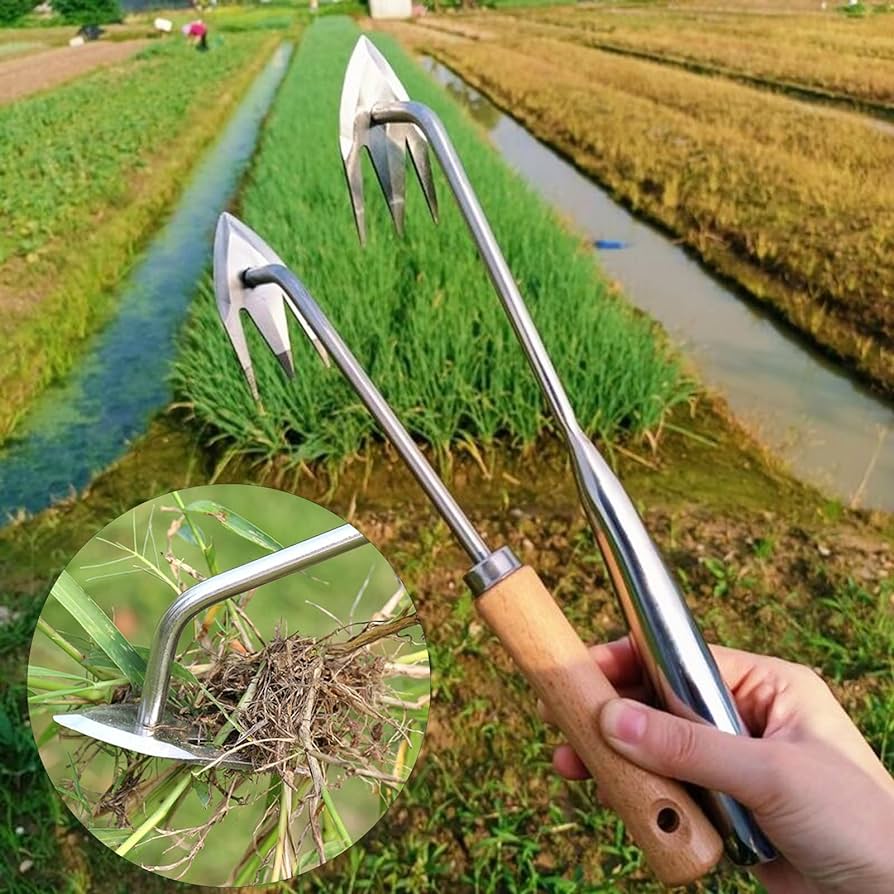
Hand Weeder Tools in Organic Gardening
Hand weeders play a crucial role in organic gardening practices:
Chemical-Free Control
Manual weeding aligns with organic principles of avoiding synthetic herbicides.
Soil Health Preservation
Hand weeding minimizes soil disturbance compared to tilling or chemical treatments.
Compost Creation
Removed weeds can be composted, returning nutrients to the garden.
Biodiversity Promotion
Selective weeding allows beneficial plants to thrive alongside cultivated species.
Water Conservation
Removing weeds reduces competition for water resources.
These practices contribute to healthier gardens and ecosystems.
Hand Weeder Tools for Different Garden Types
Hand weeders adapt to various gardening situations:
Vegetable Gardens
Precision weeders help maintain rows and protect delicate vegetable plants.
Flower Beds
Long-handled weeders allow for weeding without stepping into beds.
Rock Gardens
Narrow, pointed weeders navigate effectively between rocks and succulents.
Container Gardens
Small hand weeders suit the confined space of pots and planters.
Native Plant Gardens
Selective weeding tools help manage invasive species while preserving natives.
Choosing the right tool for each garden type improves efficiency and results.
Hand Weeder Tools in Professional Landscaping
Professional landscapers often use hand weeders for specific tasks:
Detail Work
Hand tools allow for precise weed removal around valuable plants.
Client Education
Manual weeding demonstrates thorough garden care to clients.
Environmentally Sensitive Areas
Hand tools are preferred in areas where chemical use is restricted.
Ornamental Gardens
Careful weeding preserves the aesthetic of meticulously designed landscapes.
Green Roofs
Lightweight hand tools suit the unique environment of rooftop gardens.
These versatile tools complement larger equipment in professional settings.
The Future of Hand Weeder Tools
Innovation continues in hand weeder design:
Ergonomic Improvements
New handle designs reduce strain and improve comfort during use.
Multi-function Tools
Manufacturers develop tools combining weeding with other gardening functions.
Sustainable Materials
Eco-friendly materials appear in tool construction.
Precision Enhancements
Some tools incorporate features for more accurate root targeting.
Adaptive Designs
Adjustable tools cater to various user heights and abilities.
These advancements make hand weeding more efficient and accessible.
Hand Weeder Tools in Sustainable Landscaping
Hand weeders contribute to sustainable landscaping practices:
Water Conservation
Removing weeds reduces competition for water resources.
Natural Pest Control
Manual weeding disrupts pest habitats without chemical interventions.
Soil Structure Preservation
Hand tools minimize soil compaction compared to machinery.
Native Plant Promotion
Selective weeding allows native species to thrive.
Reduced Carbon Footprint
Manual tools require no fuel and produce no emissions.
These practices align with environmentally conscious gardening approaches.
Safety Considerations for Hand Weeder Tools
Using hand weeders safely is crucial:
Gloves
Wear gloves to protect hands from blisters and thorns.
Proper Footwear
Use closed-toe shoes to prevent injury from sharp tool edges.
Eye Protection
Wear safety glasses to shield eyes from soil and debris.
Sun Protection
Use sunscreen and wear a hat during extended weeding sessions.
Proper Posture
Maintain good posture to prevent back strain.
Tool Inspection
Check for loose parts or damage before each use.
Following these safety practices ensures a positive gardening experience.
Conclusion
Hand weeder tools remain essential implements for gardeners of all levels. Their precision, eco-friendliness, and versatility make them invaluable for maintaining healthy, weed-free gardens. From small container plants to expansive landscapes, hand weeders offer an effective solution for targeted weed removal.
The variety of hand weeder designs ensures that every gardener can find the right tool for their needs. Whether dealing with deep-rooted perennials or shallow-rooted annual weeds, a suitable hand weeder exists for the task. The physical engagement and connection to the earth that these tools provide enhance the gardening experience.
As sustainable and organic gardening practices gain popularity, hand weeder tools become increasingly relevant. They allow for precise weed management without the environmental impact of chemical herbicides. This makes them ideal for environmentally conscious gardeners and professionals alike.
While chemical weed control has its place in large-scale agriculture, hand weeders excel in home gardens and for selective weed removal. Their precision, simplicity, and low maintenance requirements make them a practical choice for most gardening tasks. As tool designs continue to evolve, hand weeders are likely to become even more efficient and user-friendly.
Ultimately, the hand weeder tool represents a bridge between traditional gardening methods and modern horticultural practices. It embodies the hands-on approach that many gardeners value, while adapting to contemporary needs for sustainability and efficiency. For anyone looking to maintain a thriving, weed-free garden, a quality hand weeder tool is an investment that pays dividends in healthier plants and more productive soil.
